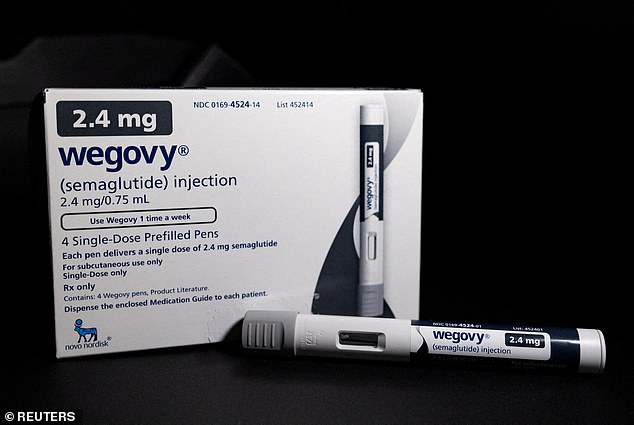The revolutionary weight-loss jabs that ministers hope will turn the tide in Britain’s war on flab are weakening patients’ muscles, a pharmaceutical chief has warned.
Injections, such as Wegovy and Saxenda, which mimic a hormone that tricks the body into being full, have been approved in Britain to help tackle the obesity crisis.
But Pascal Soriot, head of pharmaceutical giant AstraZeneca, a company best known for its Covid vaccine, warned they could shrink patients’ muscles.
Doctors have previously warned that this effect could leave users metabolically “fatter,” because they then have a higher fat-to-muscle percentage, and increases the risk that they will pack on the pounds again once they stop taking the drug.
“Today you lose weight but you lose fat and you lose muscle,” said Mr. Soriot, according to The Telegraph.
AstraZeneca boss Pascal Soriot has warned of the downsides of weight-loss shots made by the company’s rivals as the Anglo-Swedish drugmaker tries to enter the obesity drugs market.

Soriot said weight-loss injections, such as those from market leader Wegovy, cause patients to lose muscle as well as fat and also lamented the environmental cost of single-use injections.
“Most people, as soon as they stop taking the medications, regain the fat, but not as much of the muscle they lost, unless, of course, they go to the gym.”
AstraZeneca is lagging behind rival pharmaceutical giants in its weight-loss offerings, but is awaiting a pill, which the manufacturer hopes will outperform injection offerings.
The weight loss drug market is expected to be worth billions in the coming years as nations grapple with the financial and social cost of obesity.
Soriot said pharmaceutical companies needed to “improve the quality” of weight loss to ensure the effects did not wear off when patients stopped taking them and to reduce side effects such as loss of muscle mass.
He also lamented the environmental cost of single-use injections.
‘If you think about a billion people using a plastic pen every week, that’s a lot of plastic. “All these plastic pens will become a problem at some point,” he said.
The Anglo-Swedish company has fallen behind rivals such as Denmark’s Novo Nordisk, which makes Wegovy, and the American Eli Lilly, creator of the recently approved Mounjaro.
But he hopes that an upcoming pill, cheaper than injections, will allow him to gain ground in the market.
AstraZeneca has reached a £1.6bn deal with Chinese biotech company Eccogene for an experimental pill they are developing.
Soriot said the overall goal will be to combine the fat-busting pill with other drugs to help treat some of the consequences of obesity, such as hypertension and heart disease.
While the price of the pill has not been announced, weight loss injections can cost between £180 and £300 per dose privately.
However, if prescribed on the NHS, people will only pay a basic prescription charge of £9.65 in England.
Market leader Novo Nordisk has its specific weight-loss vaccine Wegovy, as well as Ozempic, a diabetes drug that uses the same active ingredient and has been controversially prescribed “off-label” for weight loss.
This has led to some diabetic patients using the drug facing supply shortages.
Novo Nordisk is enjoying a huge profit boom, revealing last month it was earning £32m a day, as countries grapple with the financial cost of flabbiness and struggle to take the hits.
The United Kingdom is one of them. The latest data from England shows that almost two-thirds of adults are too fat, compared to just half in the mid-1990s.
Obesity also has a financial cost, with health consequences resulting in lost years of work, care costs and the price of NHS treatment costing the economy an estimated £100 billion per year.

Experts have warned that Wegovy is not a “magic pill.” Trials have shown that users can quickly gain weight again once they stop taking it, and it can cause side effects such as nausea, constipation, and diarrhea.
While hailed as a “game changer” in the fight against bulging waists, punches do have downsides.
Patients have to take the hits for life or watch the pounds they lost pile up, doctors have warned.
Second, like any medication, they can have side effects that vary in both frequency and severity.
These include nausea, constipation and diarrhea, fatigue, stomach pain, headaches and dizziness.
Stranger and much rarer side effects, such as hair loss, have also been reported.


